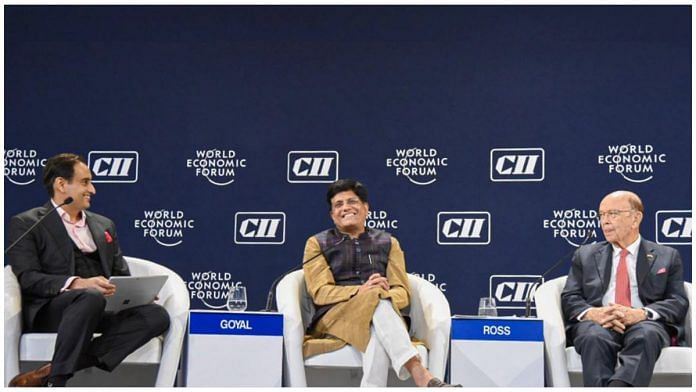New Delhi: Commerce and Industry Minister Piyush Goyal and US Commerce Secretary Wilbur Ross held a bilateral meeting Thursday as both India and the US are trying to address some of the friction points in bilateral trade to strike a deal.
A wide range of issues were discussed at the bilateral meeting between Goyal and Ross, including relaxation in some Indian policies on e-commerce and data localisation, doing away with price control measures on American medical devices as well as launching talks for a free trade agreement between India and the US, sources told ThePrint.
The Union minister, who was part of Prime Minister Narendra Modi’s entourage during his trip to the US last month, had met US Trade Representative (USTR) Robert Lighthizer to discuss some of the pressing issues that continue to hamper the two-way trade.
However, this is the first time that Goyal met Ross in New Delhi since becoming the Commerce and Industry Minister in the second tenure of the Modi government.
Earlier in the day, during a joint session on ‘Trading Against the Tide’ at the India Economic Summit of the World Economic Forum, both the ministers had a stern exchange over some of the Indian polices and regulatory mechanisms as far as doing trade and business by foreign companies are concerned.
At the panel discussion, Ross said nothing should stop the Modi government from having a trade deal with the US now since the Lok Sabha elections are over.
“We do think there is no structural reason why there cannot be a trade deal (between the US and India) pretty quickly. Now that the election has gone, it should be a lot easier to do it,” Ross said.
He was responding to Goyal’s statement that the hype around India-US trade deal was “unwarranted” since he had met USTR Lighthizer and others in New York only last week. Complex trade deals, the Union minister had said, cannot be concluded quickly.
Also read: India, US look to clinch ‘watered down’ trade deal after differences scuttle larger pact
‘India will always protect small retailers’
Goyal also came down heavily on Ross while discussing India’s e-commerce policies and entry of foreign retailers. The Union minister said India will never allow the likes of Amazon and Walmart to govern the country’s law as far as policies on retail trade are concerned, be it on single-brand or multi-brand.
“There is no change in India’s stand on e-commerce. India is very clear that 120-130 million are dependent on small retail, and this is a sensitive subject and we will continue to protect them. My party is clear that we cannot let small retail die. E-commerce is expected to be an agnostic platform to trade on and not a platform for predatory pricing or to show muscle power,” Goyal said.
He added, “I want to clarify that the spirit of Indian law is protecting small retail. In that spirit, we welcome all big retailers to enter India.”
To this, Ross retorted saying these are some of the reasons why Amazon did not go through its planned investment in India since the company found the Modi government’s e-commerce policy difficult.
“Will continue to discuss these issues with the Indian government… Amazon and other US retailers did not get to become the world’s biggest companies due to any evil reason. They have become what they are today due to efficiency,” Ross stressed, adding that India and the US will find out a balancing act on this.
The US Commerce Secretary also said India should identify how it can take advantage of some of the trade wars that are taking place — especially referring to the US-China tiff.
While Goyal tried to highlight how US imports into India are growing and the country’s trade deficit with America is much less than what Washington has with Beijing, Ross remarked saying it did not mean that the Donald Trump administration cannot deal in “unfair trade practices”.
US has a trade deficit of $336 billion with China while it is $24 billion with India.
Also read: Fresh from Howdy, Modi! bonhomie, PM & Trump to get cracking on easing trade tensions
‘Torrid love affair between India and US’
Ross later also hinted that Washington was not pleased with New Delhi’s decision to purchase the S-400 missile systems from Moscow. Talking about the CAATSA (Countering America’s Adversaries Through Sanctions Act) legislation, the US commerce secretary said India should have a rational approach to it.
Earlier this week, Foreign Minister S. Jaishankar in one of his addresses to Washington-based think-tank CSIS had stated that he is “reasonably convinced” of his “persuasion powers” in convincing the US why India will procure the anti-aircraft missile systems from Russia.
During the discussion, Goyal also remarked how US and India have a “torrid love affair”.
Also read: Modi and Trump likely to unveil ‘limited’ India-US trade package this month




Secretary Wilbur Ross has said that India is one of the most – if not the most – protectionist countries in the world. Apart from the trade disputes India and the US are trying – so far unsuccessfully – to resolve, that is not a good situation for the Indian economy to be in. Exports are stagnant, important sectors are sluggish, global competitiveness is falling across the board. These are the big picture interventions a federal government – working closely with state governments – is required to make.